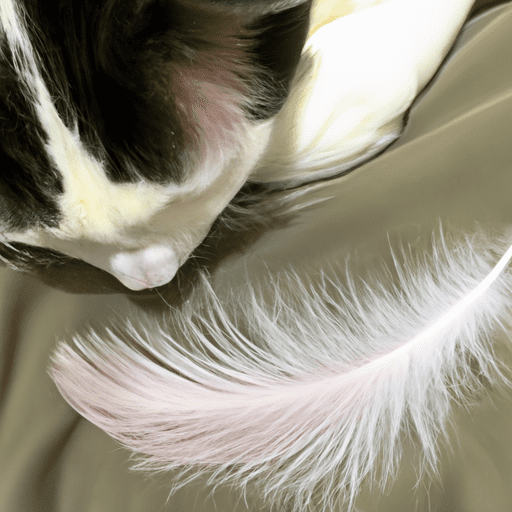If you’ve ever experienced the joy of having a furry feline companion, you know that their love knows no limits. But what about cats with special needs? These remarkable creatures, with their unique challenges and abilities, deserve our love and care just as much as any other cat. In this article, we’ll explore the world of caring for special needs cats and learn how love can truly transcend any boundary. Whether it’s providing proper medical attention, adapting their environment, or simply showering them with affection, we’ll discover that these extraordinary cats have so much love to give, and it’s up to us to meet their needs. So join us as we embark on a heartwarming journey into the world of caring for special needs cats – a journey where compassion knows no bounds.
Understanding Special Needs Cats
Special needs cats require extra care and attention due to various physical or mental conditions they may have. It is important to understand the different types of special needs they may have in order to provide them with the appropriate care and support they need.
Different types of special needs
Special needs in cats can manifest in various ways, such as physical disabilities, chronic illnesses, or behavioral challenges. Physical disabilities can include blindness, deafness, or mobility issues. Chronic illnesses can range from diabetes to kidney disease, while behavioral challenges might involve anxiety or aggression. Each special needs cat is unique and may require specific accommodations and care.
Common challenges special needs cats face
Special needs cats face a range of challenges in their daily lives. They may struggle with mobility, have difficulty accessing food or water, or need assistance with grooming. Some cats may require regular medication or treatments for their medical conditions. Additionally, special needs cats may experience emotional challenges such as anxiety or fear, which can affect their overall well-being.
The importance of understanding their specific needs
Understanding the specific needs of special needs cats is crucial for providing them with a high quality of life. By understanding their limitations and challenges, we can create an environment that promotes their comfort, safety, and overall well-being. It allows us to address their unique requirements effectively, leading to happier and healthier lives for these special feline companions.
Creating a Safe Environment
Creating a safe environment for special needs cats is essential to ensure their safety and comfort. By making simple adjustments to our homes, we can provide them with the accessibility they need to navigate and thrive.
Making the home accessible
To make the home accessible for special needs cats, it is important to eliminate any potential hazards or obstacles. This includes removing clutter, securing loose cords, and blocking off areas that may be unsafe for them, such as high ledges or stairs. Additionally, using ramps or steps can help cats with mobility issues reach their favorite elevated spots.
Providing comfortable and accessible sleeping areas
Special needs cats may require extra support and comfort when it comes to their sleeping areas. Providing soft bedding that is easily accessible, such as low-sided beds or heated pads, can ensure they have a safe and comfortable place to rest. Consider placing these sleeping areas in quiet and calm spaces to help reduce stress.
Ensuring safety indoors and outdoors
Indoor and outdoor safety is crucial for special needs cats. For indoor safety, ensure that windows and balconies are securely screened to prevent falls. Cat proofing doors and windows with baby gates or specialized barriers can help prevent escape or access to dangerous areas. If allowing outdoor access, consider constructing a safe and enclosed outdoor space or using a cat harness and leash for supervised outings.
Feeding and Hydration
Providing appropriate nutrition and hydration is vital for the overall well-being of special needs cats. These cats may have specific dietary requirements that need to be taken into consideration.
Special dietary requirements
Special needs cats may require a specialized diet to manage their medical conditions. Some may need food formulated for sensitive stomachs, while others may require a prescription diet to regulate their blood sugar levels or support kidney functions. Working closely with a veterinarian to determine the right diet for your cat’s specific needs is crucial.
Assisting with feeding and hydration
Some special needs cats may require assistance with their feeding and hydration. Cats with physical disabilities or mobility issues may have difficulty accessing their food and water bowls. Elevating the bowls to a comfortable height or using food puzzles and interactive water dispensers can help these cats eat and drink with ease.
Monitoring weight and nutritional needs
Regularly monitoring a special needs cat’s weight and nutritional needs is essential. Depending on their medical conditions, they may require regular weight checks, dietary adjustments, or supplements. Close communication with a veterinarian can help ensure that the cat’s nutritional needs are met, and any weight changes are promptly addressed.
Managing Medical Conditions
Special needs cats often have unique medical conditions that require ongoing management and care. Understanding these conditions and following proper medical protocols is crucial for their well-being.
Understanding common medical conditions in special needs cats
Special needs cats can have a variety of medical conditions, such as diabetes, hyperthyroidism, or arthritis. It is important to educate yourself about these conditions to better understand their effects on your cat’s health. This knowledge will equip you to proactively manage their conditions and provide appropriate care.
Administering medications and treatments
Many special needs cats require regular medication or treatments to manage their medical conditions. Administering medications may involve oral medications, injections, or topical applications. It is important to follow veterinary instructions carefully and ensure that the cat receives the correct dosage at the prescribed times.
Regular veterinary check-ups and monitoring
Routine veterinary check-ups are vital for special needs cats to ensure their conditions are monitored and managed effectively. Regular examinations, blood work, and diagnostic tests can help identify any changes or concerns early on. By staying in close contact with your veterinarian, you can address any emerging issues and adjust treatment plans as needed.
Physical and Mental Stimulation
Physical and mental stimulation is crucial for the overall well-being and happiness of special needs cats. Although their abilities may be different from their counterparts, they still benefit greatly from engaging activities.
Exercise and play adapted to their abilities
Special needs cats may have physical limitations that require exercise routines and play activities to be adapted accordingly. Low-impact exercises, such as gentle play sessions with interactive toys or short walks with a harness and leash, can help maintain their mobility and overall fitness. Personalize play sessions to accommodate their unique capabilities and energy levels.
Providing mental enrichment and stimulation
Mental stimulation is essential for special needs cats and can improve their cognitive abilities and overall happiness. Puzzle toys, treat dispensers, and interactive games designed specifically for cats can provide mental challenges and engage their curiosity. Creating a stimulating environment with climbing structures, hiding spots, and puzzle feeders can help keep their minds active and entertained.
Creating a routine to promote their well-being
Establishing a routine is beneficial for special needs cats as it provides a sense of predictability and security. Consistency in feeding times, play sessions, and social interactions can be reassuring for them. A well-structured routine helps reduce anxiety and stress, promoting their overall well-being and contentment.
Building Trust and Bonding
Building a strong bond and establishing trust with special needs cats is essential for their emotional well-being. By approaching them with patience, understanding, and positive reinforcement, we can help them feel safe and loved.
Patience and understanding
Special needs cats may require more time and patience to adjust to their surroundings and build trust with their caregivers. Approaching them calmly and giving them space to acclimate to new situations is important. It is crucial to understand that their behaviors might be different from typical cats due to their unique needs, and responding with patience and empathy is key.
Positive reinforcement training
Positive reinforcement training is a valuable tool for building trust and encouraging desired behaviors in special needs cats. Rewarding them with treats, praise, or play when they exhibit positive behaviors helps reinforce trust and confidence. By focusing on positive interactions and rewarding good behavior, we can build a strong and loving bond with our special feline companions.
Establishing a secure and loving bond
Developing a secure and loving bond with special needs cats requires consistency, understanding, and affection. Spending quality time with them, offering gentle physical contact, and providing a nurturing and safe environment all contribute to building a strong bond. By being their reliable and loving caregiver, we can help them feel secure and valued.
Socializing and Interaction
Socializing and positive interactions are important aspects of a special needs cat’s life. Whether with other animals or humans, creating supportive and harmonious relationships is vital for their social and emotional well-being.
Introducing special needs cats to other pets
Introducing special needs cats to other pets should be done gradually and under supervision. Allowing separate spaces for each pet initially and gradually integrating them through scent and visual exposure can help ease the introduction process. Supervised interactions and positive reinforcement for calm behavior can help establish positive relationships between pets.
Facilitating positive interactions with humans
Special needs cats benefit from positive interactions with humans, helping them feel loved and valued. Spending quality time playing, grooming, and cuddling with them can strengthen the bond between cat and caregiver. Providing gentle physical contact, such as petting and massage, can also be soothing and comforting for these cats.
Addressing behavioral challenges
Special needs cats may exhibit behavioral challenges due to their conditions or past experiences. It is important to address these challenges with patience and understanding. Working with a veterinarian or a professional animal behaviorist can provide valuable insights and strategies for managing and modifying any problem behaviors.
Mobility and Assistive Devices
Special needs cats with mobility issues or physical disabilities may benefit from assistive devices and aids to improve their quality of life. Assessing their needs and making necessary adaptations can greatly enhance their mobility and independence.
Assessing mobility and accessibility needs
Assessing a special needs cat’s mobility and accessibility needs helps determine the type of assistance they may require. Observing their movements, consulting with a veterinarian, and considering their limitations can guide decisions on suitable assistive devices or adaptations.
Using assistive devices and aids
Assistive devices and aids can greatly improve a special needs cat’s mobility and independence. Examples include wheelchairs or carts for cats with limited mobility, raised feeding stations for cats with neck or back issues, and ramps or stairs to help cats access higher surfaces. These devices are designed to support their specific needs and allow them to navigate their environment more easily.
Adapting the home for mobility
Making adaptations to the home environment is important for special needs cats with mobility challenges. Installing ramps or steps to access furniture or providing low-sided litter boxes for easier entry are just a few examples. By ensuring their environment is tailored to their capabilities, we can help them move around more comfortably and confidently.
Supportive Care and Home Remedies
Special needs cats may benefit from supportive care and home remedies to manage their conditions and improve their overall well-being. While professional veterinary care is crucial, some additional measures can be incorporated to enhance their comfort and quality of life.
Pain management and comfort measures
Special needs cats with chronic conditions or mobility issues may experience discomfort or pain. Working closely with a veterinarian to manage pain through medication or alternative therapies can significantly improve their quality of life. Additionally, providing cozy warm beds, heated mats, or orthopedic bedding can help alleviate any discomfort and promote relaxation.
Natural remedies and alternative therapies
Some caregivers may explore natural remedies or alternative therapies to complement veterinary care for their special needs cats. These might include herbal supplements or acupuncture, which can provide additional relief or support. However, it is important to consult with a veterinarian before using any natural remedies to ensure they are safe and appropriate for your cat.
Monitoring and adapting care over time
The needs of special needs cats may change over time, requiring adjustments to their care. Regularly monitoring their condition and behavior can help identify any emerging challenges or changes in their requirements. Being observant and adaptable ensures that their care is continuously tailored to their evolving needs, promoting their overall well-being.
Emotional Support for Caregivers
Caring for special needs cats can be emotionally challenging for their caregivers. Managing these challenges and seeking support when needed is crucial to maintain their own well-being during the caregiving journey.
Coping with challenges and emotional strain
Caring for a special needs cat can bring about various challenges and emotional strain. It is important for caregivers to acknowledge their own emotions and seek healthy coping mechanisms. This may involve identifying support systems, practicing self-care, or seeking professional help when needed. Remember, you are not alone, and it is okay to ask for support.
Seeking support from others
Seeking support from others who understand and empathize with the unique challenges of caring for special needs cats can be invaluable. Joining online communities or support groups for caregivers of special needs pets can provide a safe space for sharing experiences, seeking advice, and receiving emotional support. Connecting with others who have similar experiences can help ease the journey and provide a sense of belonging.
Taking care of yourself while caring for special needs cats
While caring for special needs cats, it is essential to prioritize self-care and take care of your own well-being as a caregiver. Ensure you are getting enough rest, eating well, staying physically active, and engaging in activities that bring you joy and relaxation. Taking care of yourself enables you to provide the best care for your special feline companion and ensures that you can face the challenges with resilience and love.
In conclusion, caring for special needs cats requires understanding, compassion, and dedication. By creating a safe environment, addressing their specific needs, providing appropriate health management, and fostering a strong bond, we can ensure that these incredible cats thrive and enjoy a life filled with love and support. Remember, love knows no boundaries when it comes to caring for special needs cats.








